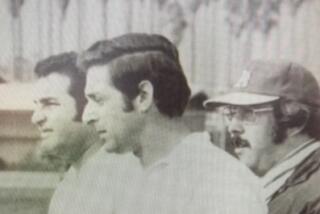Moon Needed Only One Second Chance
- Share via
HOUSTON — The boy stood handcuffed near the checkout counter, held by a security guard and watched carefully by the store manager.
The entire future of 14-year-old Warren Moon revolved around a stolen 99-cent headband.
Or so he felt at the time.
“It was the most embarrassing moment of my life,” the Houston Oilers quarterback said. “I was standing in the middle of the store and everyone had a chance to see me. I felt as low as I could possibly feel.
“Then my mom came to pick me up and the look in her eyes, I could see the hurt and I knew I’d really screwed up and hurt her bad.”
Moon went into the store with two friends to buy ice cream and as they wandered through the aisles Moon’s companions each grabbed a headband and stuffed it in their pants.
“Being along and being stupid, I did the same thing,” Moon said.
Moon got his ice cream and a candy bar and went to the front of the store. But a loudspeaker alerted the security guard to “stop those three boys at the counter.” The other two boys ran. Moon was sacked and searched.
“They searched me and found the headband,” Moon said. “I had $3 in my pocket and could have paid for it.”
In his worst moment, Moon got a break.
“The store manager thought he’d taught me a lesson and didn’t press charges,” Moon said. “He gave me a second chance and my Mom stressed that I was getting a second chance and not to blow it. From that day forward, I never did anything like that again.”
Moon has made the most of his second chances since that day at the neighborhood store.
He’s also given plenty of second chances through his Cresent Moon charitable foundation, helping steer others away from the temptations of the streets.
“I’ve had to kind of take that extra step at every level just to show what I can do whether it be junior college or Canada before I got a chance to play in the NFL,” Moon said.
Second chances.
Moon was an all-city performer at Los Angeles Hamilton High and attended West Los Angeles Junior College to get a second chance to play big time college football at the University of Washington, where he was the 1978 most valuable player in the Rose Bowl and PAC-8 player of the year.
He played six seasons in the Canadian Football League after college before he got a second chance to play for the Houston Oilers, where this season he became the only pro quarterback to pass for 20,000 yards in both the Canadian Football League and the NFL.
“I’ve been told all my life that I couldn’t play this position, that I didn’t have what it took,” Moon said. “There were people on the other side saying that I could but it was the people who told me I couldn’t that kept me going. I have a lot of confidence in myself.”
Part of Moon’s lack of acceptance as a quarterback centered around being black. Moon is proud of the part he’s played, along with Philadelphia’s Randall Cunningham and former Washington quarterback Doug Williams, in clearing the way for future NFL black quarterbacks.
Right now, Moon rates among the best of all NFL quarterbacks. He is second in the AFC and fifth overall with an 89.3 rating. Although he has been intercepted 11 times -- only Boomer Esiason has thrown more among conference passers -- he also has thrown for 19 touchdowns, second only to Joe Montana. And his 2,830 yards trails only Montana.
Moon became a close friend last year with Heisman Trophy winner Andre Ware, now a rookie with the Detroit Lions. He rented a freeway billboard to congratulate the University of Houston star on his award.
“Doug’s achievements helped more than anybody else’s because he got to the highest point of the pedestal,” Moon said. “That put him in a class with the great ones and turned a lot of heads as far as some of the stereotypes and stigmas that were placed on black quarterbacks.”
The only stereotype Oilers offensive coordinator Kevin Gilbride sees in Moon is that he is the perfect stereotype of a run-and-shoot quarterback.
“You pretty much describe Warren when you talk about the qualities you look for in a run-and-shoot quarterback,” Gilbride said. “He’s done a great job of putting us where we need to be. All we need are a few more Ws.”
The focus in the run-and-shoot is the quarterback, Gilbride said.
“If you run an I-formation, you’d better have a great tailback otherwise you’re kidding yourself,” Gilbride said. “If you’re in the run-and-shoot, it’s critical that the guy playing quarterback is of the same vintage.
“If you ask him to throw 40 to 60 passes a game and he’s not performing very well, you don’t have much offense.”
Wide receiver Ernest Givins is convinced Moon is the man and the run-and-shoot is the offense to lead the Oilers to the Super Bowl.
“You couldn’t ask for an better offense that fits the style of Warren,” Givins said. “He rolls out better than anybody, he throws on the move better than anybody I’ve ever seen or throws back across the field. It just fits him.”
Moon is one of the wealthiest players in the game, he’s at the top of his profession with the respect of his peers. All that remains is “the big one,” getting to the Super Bowl.
“I never look at it in terms that I’ll never do it,” Moon said. “It’s something I want and it’s something that burns inside me.”
He also realizes that at 33 he may be running out of second chances.
“I don’t have a lot of time left to do it, maybe two or three more years,” Moon said. “This team is at the stage where in the next two years there’s going to be major changes and start the wheel all over. I don’t have time to go through a rebuilding situation.”
Whether Moon reaches the Super Bowl or not, he’s already a hero to both young and old through his Cresent Moon Foundation. He was named the NFL Man of the Year for 1990 because of the varied programs his organization funds.
Moon has special motivation for helping. He grew up with six sisters, a mother and no father.
“I wouldn’t be sitting here today if it wasn’t for some of the organizations that I was involved with as a kid,” Moon said. “It’s not just the organizations but the people who took the time because they realized I didn’t have a Dad around the house.”
Moon was seven when his father died needing a liver transplant that never came.
“I had a strong mom who played both roles but I also had a lot of those people around that kept me focused,” Moon said.
Moon’s support group includes a kindly store manager who must now wish he’d gotten an autograph on the contraband headband.
More to Read
Go beyond the scoreboard
Get the latest on L.A.'s teams in the daily Sports Report newsletter.
You may occasionally receive promotional content from the Los Angeles Times.










